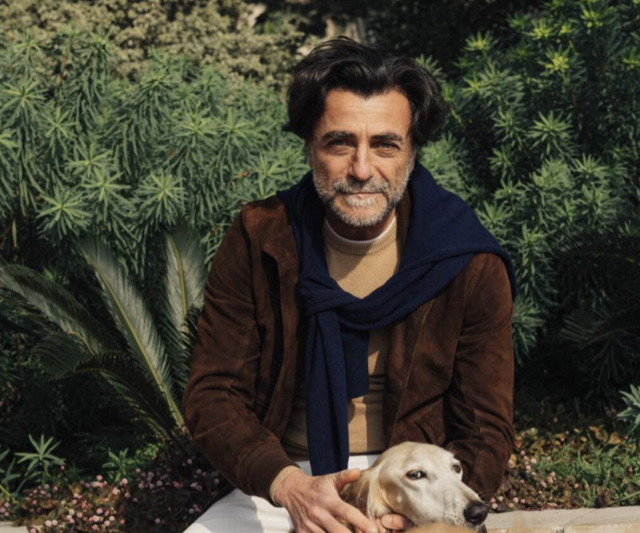Some brand stories come so swathed in lashings of romance, it’s hard to know where to begin. Ask Andrew Doyle, founder of luxury knitwear brand Formehri, and he’ll tell you that the true essence of his company lies in its name— or, rather, its namesake: his wife, Mehri.
“The story of our brand is really the story of our family,” Doyle says. The two now have three children, having met in their twenties while working for the same company. “We were on our honeymoon, I think, 11 years ago, and she made a passing comment that it was her dream to live in the south of France. I don’t know why, but I decided there and then that I was going to make it happen for her.”
Now, Doyle splits his time jet-setting between Monaco and Sydney, but he was born and raised among the more prosaic pastures of Canberra, working for much of his twenties and thirties building a successful finance recruitment company. Having taken an interest in menswear from an early age, he spent most of that time moonlighting as one of the internet’s OG menswear bloggers under the moniker Timeless Man. The site gravitated towards covering smaller, artisanal producers, eschewing big brands and splashy catwalk shows in favour of those making bespoke garments and accessories with an emphasis on quality over quantity.
“I did it for free for a decade,” he recalls. “I was always drawn to craftspeople who were creating something authentic and product driven. I would save up my money, go have these people make me a jacket and write about the process. I just found it so interesting. Pretty soon I started thinking that I’d love to do this myself.”
One would expect a chance meeting in, say, Paris or Florence to be the scenario in which Doyle got his look-in. Rather, it was on a dusty salt flat in Bolivia where, while on holiday with his wife, an opportunity presented itself to him. There, taking in the near-overwhelming silence of the Salar de Uyuni, he was reminded of nearby farmers raising vicuña: a pint-sized relative of the Alpaca prized for its ultrafine wool.
“I’d first learned about vicuña some years earlier,” Doyle says. “A contact of mine had paid John Cutler something like $50,000 to make a vicuña overcoat for him, so once I got back to La Paz I asked him to put me in touch with the local producers here.” Vicuña wool, for the uninitiated, is among the most prized fabrics in the world, orders of magnitude lighter and finer than merino or cashmere. Endemic to remote, high-altitude plateaus throughout the Andes, most vicuña are wild-farmed and, being slow-growing, hand-sheared just once every three years. Most fleeces are bought in bulk by a well-known luxury knitwear brand that, for reasons that will soon become apparent, shall remain nameless.
Back in the Bolivian capital, Doyle met with someone representing the nation’s rural community of vicuña farmers. There, he learned of the mass exploitation taking place, not just in Bolivia but across other South American countries. Despite the price of vicuña garments steadily rising, the wholesale prices paid to producers for their wool has dropped by a third in the last decade—an issue that, for those inclined to do a quick Google search, has seen our nameless brand hauled in front of a US Congressional caucus.

“They’re pretty seriously impoverished,” says Doyle. “They’re very isolated. They’re up on this plateau, really struggling day to day. Meanwhile these big brands are buying up the bulk of the wool—which is not cheap—and yet the farmers are seeing almost none of the profits. That’s when all the pieces came together for Mehri and me. We said: ‘This is it.’”
“I think it was even the next day,” he continues, “I got back in touch with them and said: ‘What if we start a company that can make the finest product in the world and we’ll give you 10 percent of everything we make in profit?’ And they just said, ‘That’s exactly what we’ve been looking for.’ As the story evolved, I felt 10 percent wasn’t enough. So now we reserve 10 percent for communities in South America, and then another 10 percent for a range of charities around both Monaco [where Andrew Doyle has a factory] and Africa, with a focus on people who really need it.”

This is, of course, all just empty talk without the product to back it up. And while Formehri is still very much a brand in its larval stage, the quality of its garments is rapidly garnering acclaim. The brand’s core range revolves around sweaters and cardigans, spun at a family-owned mill in Bologna and hand-finished in Monaco—made to order and priced accordingly. Formehri’s sweaters start at around $7,500, its shawl-neck cardigans tipping the fiscal scales at around $21,900.
Already, this plucky upstart is turning heads in the right circles. The brand recently completed a trunk show at London’s Baudoin & Lange and has recently begun a residency at famed Parisian tailors Camps de Luca. “We met Andrew many years ago as a client,” founder Jean De Luca tells us. “The philosophy behind Formehri is very similar to our own vision of craftsmanship. Formehri understands craftsmanship, patience and the time necessary to create not just a garment, but a story and a distinct moment behind each piece. Formehri goes far beyond a brand—it comes from a man truly dedicated to excellence.”

The post Fair Play appeared first on Robb Report Australia and New Zealand.
2025-03-24 05:17:00
#Fair #Play
Source link
















